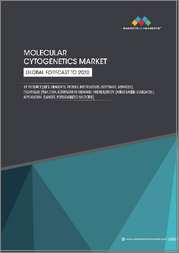
|
시장보고서
상품코드
1899557
분자 세포 유전학 시장 규모, 점유율, 성장 분석 : 제품별, 기술별, 용도별, 최종사용자별, 지역별 - 업계 예측(2026-2033년)Molecular Cytogenetics Market Size, Share, and Growth Analysis, By Product (Kits & Reagents, Testing Kits), By Technique (Comparative Genomic Hybridization), By Application, By End User, By Region - Industry Forecast 2026-2033 |
||||||
분자 세포 유전학 시장 규모는 2024년에 26억 달러로 평가되었고, 2025년 28억 2,000만 달러에서 2033년까지 55억 달러로 성장할 전망이며, 예측 기간(2026-2033년) CAGR은 8.7%를 보일 것으로 예측됩니다.
분자 세포 유전학은 분자생물학과 세포유전학을 융합하여 정상세포와 암세포를 구별함으로써 암의 발견과 치료를 향상시킵니다. 이 분야는 염색체 이상 연구에 중요한 역할을 하며, 형광 in situ hybridization(FISH) 등의 기술을 이용하여 특정 유전체 영역을 분석합니다. 시장은 암과 유전성 질환의 유병률 증가, 고령화 인구 증가에 의해 크게 견인되고 있습니다. 주요 응용 분야로는 질병 모델 확립 및 표적 치료법 개발 등이 있습니다. 또한, 개선된 시약, 소프트웨어, 키트 등의 기술 발전은 진단의 정확성과 신뢰성을 향상시키는 데 기여하고 있습니다. 바이오 메디컬 연구에 대한 지속적인 투자와 의료 인프라 개선은 시장의 성장 궤도를 더욱 공고히 하고, 개인화된 치료 옵션과 종합적인 환자 관리의 필요성을 뒷받침하고 있습니다.
분자 세포 유전학 시장 성장 촉진요인
분자 세포 유전학 시장은 세포유전학과 분자생물학의 통합으로 인해 괄목할 만한 성장이 예상됩니다. 이 신흥 분야는 더 많은 연구자와 임상의들이 유전성 질환의 진단과 이해에 있어 그 가치를 인식함에 따라 수요가 증가할 것으로 예측됩니다. 또한, 암 발생률 증가는 염색체 이상과 유전자 기능에 대한 중요한 지식을 제공하는 분자 세포 유전학 기술의 채택을 더욱 촉진할 것으로 예측됩니다. 기술 및 조사 방법론의 지속적인 발전과 함께 이러한 강력한 요인에 힘입어 시장은 크게 확대될 가능성이 높습니다.
분자 세포 유전학 시장 성장 억제요인
분자 세포 유전학 시장이 직면한 주요 과제 중 하나는 성장을 크게 저해하는 불리한 상환 정책의 존재입니다. 보험사들은 분자진단 검사에 대한 비용 부담을 꺼려하는 경우가 많아 필수적인 서비스를 원하는 환자들에게 장벽이 되고 있습니다. 또한, 유전자 검사 비용이 비싸다는 점(1회 검사에 약 300달러에 달하는 경우가 많음)은 이러한 중요한 기술에 대한 접근성을 더욱 제한하고 있습니다. 분자진단은 조기 발견과 개입에 필수적이기 때문에 높은 비용과 보험 지원 부족은 분자 세포 유전학의 광범위한 보급과 발전에 큰 장애물이 되고 있습니다.
분자 세포 유전학 시장 동향
분자 세포 유전학 시장은 종양학에서 맞춤형 의료에 대한 관심이 높아짐에 따라 괄목할 만한 성장세를 보이고 있습니다. 유전체에 대한 깊은 이해는 진단의 정확성을 높이고 치료 전략을 개별화하는 데 있어 암 치료에 필수적인 요소로 자리 잡고 있습니다. 분자 세포 유전학이 치료법 선택, 예후 예측, 재발 위험 평가에 있어 매우 중요하다는 것이 입증되면서 종양학이 주요 응용 분야로 부상하고 있습니다. 또한, 개인 맞춤형 치료와 약물 치료로의 전환이 시장의 추가 확대를 촉진할 것으로 예측됩니다. 이러한 추세는 고급 유전체 지식을 통해 환자 치료 결과를 개선하고 암 치료 프로토콜에 혁신을 가져온다는 보다 광범위한 노력을 반영하고 있습니다.
자주 묻는 질문
목차
서론
- 조사 목적
- 조사 범위
- 정의
조사 방법
- 정보 조달
- 2차와 1차 데이터 방법
- 시장 규모 예측
- 시장 전제조건과 제한
주요 요약
- 세계 시장 전망
- 공급과 수요 동향 분석
- 부문별 기회 분석
시장 역학과 전망
- 시장 규모
- 시장 역학
- 성장 촉진요인과 기회
- 성장 억제요인과 과제
- Porter의 Five Forces 분석
주요 시장 인사이트
- 중요 성공 요인
- 경쟁 정도
- 주요 투자 기회
- 시장 생태계
- 시장의 매력 지수(2025년)
- PESTEL 분석
- 거시경제 지표
- 밸류체인 분석
- 가격 분석
- 기술적 진보
- 규제 상황
- 사례 연구
- 특허 분석
세계의 분자 세포 유전학 시장 규모 : 제품별&CAGR(2026-2033)
- 키트 및 시약
- 검사 키트
- 프로브
- 형광 친화성 시약
- 기타 키트 및 시약
- 기기
- 소모품
- 소프트웨어 및 서비스
세계의 분자 세포 유전학 시장 규모 : 기술별&CAGR(2026-2033)
- Comparative Genomic Hybridization
- Array-Based Comparative Genomic Hybridization
- Standard Comparative Genomic Hybridization
- Fluorescence In-Situ Hybridization
- Chromogenic In-Situ Hybridization
- Karyotyping
- 스펙트럼
- 가상
- 기타 기술
세계의 분자 세포 유전학 시장 규모 : 용도별&CAGR(2026-2033)
- 유전성 질환
- 암
- 맞춤형 의료
- 기타 용도
세계의 분자 세포 유전학 시장 규모 : 최종사용자별&CAGR(2026-2033)
- 임상 및 연구 검사실
- 병원 및 병리 검사실
- 학술연구기관
- 제약 기업 및 바이오테크놀러지 기업
- 기타 최종사용자
세계의 분자 세포 유전학 시장 규모&CAGR(2026-2033)
- 북미
- 미국
- 캐나다
- 유럽
- 독일
- 스페인
- 프랑스
- 영국
- 이탈리아
- 기타 유럽
- 아시아태평양
- 중국
- 인도
- 일본
- 한국
- 기타 아시아태평양
- 라틴아메리카
- 브라질
- 기타 라틴아메리카
- 중동 및 아프리카
- GCC 국가
- 남아프리카공화국
- 기타 중동 및 아프리카
경쟁 정보
- 주요 5개사 비교
- 주요 기업의 시장 포지셔닝(2025년)
- 주요 시장 기업이 채택한 전략
- 최근 시장 동향
- 기업의 시장 점유율 분석(2025년)
- 주요 기업 개요
- 기업 상세
- 제품 포트폴리오 분석
- 기업 부문별 점유율 분석
- 매출 전년대비 비교(2021-2023)
주요 기업 개요
- F. Hoffmann-la roche ltd.
- Agilent technologies, inc.
- Abbott laboratories
- Thermo fisher scientific, inc.
- Illumina inc.
- Revvity
- Pacific biosciences
- Bio-rad laboratories, inc.
- Bio-techne corporation
- Genedx
- Bioview
- Applied spectral imaging, inc.
- Cytotest inc.
- Kromatid, inc.
- Genial genetic solutions ltd.
- Cytognomix, inc.
- Metasystems
- Scigene
- Biomodal
- Biocare medical
결론과 제안
LSH 26.01.14Molecular Cytogenetics Market size was valued at USD 2.6 Billion in 2024 and is poised to grow from USD 2.82 Billion in 2025 to USD 5.5 Billion by 2033, growing at a CAGR of 8.7% during the forecast period (2026-2033).
Molecular cytogenetics combines molecular biology and cytogenetics to distinguish between healthy and cancerous cells, enhancing cancer detection and treatment. This field plays a vital role in studying chromosomal abnormalities and utilizes techniques like fluorescence in situ hybridization (FISH) to analyze specific genomic regions. The market is significantly driven by the rising prevalence of cancer and genetic disorders, coupled with an aging population. Its primary applications include establishing disease models and developing targeted therapies. Additionally, advancements in technology, such as improved reagents, software, and kits, contribute to enhanced diagnostic accuracy and reliability. The ongoing investment in biomedical research and improvements in healthcare infrastructure further solidify the market's growth trajectory, supporting the need for tailored treatment options and comprehensive patient management.
Top-down and bottom-up approaches were used to estimate and validate the size of the Molecular Cytogenetics market and to estimate the size of various other dependent submarkets. The research methodology used to estimate the market size includes the following details: The key players in the market were identified through secondary research, and their market shares in the respective regions were determined through primary and secondary research. This entire procedure includes the study of the annual and financial reports of the top market players and extensive interviews for key insights from industry leaders such as CEOs, VPs, directors, and marketing executives. All percentage shares split, and breakdowns were determined using secondary sources and verified through Primary sources. All possible parameters that affect the markets covered in this research study have been accounted for, viewed in extensive detail, verified through primary research, and analyzed to get the final quantitative and qualitative data.
Molecular Cytogenetics Market Segments Analysis
Global Molecular Cytogenetics Market is segmented by product, technique, application, end user and region. Based on product, the market is segmented into kits & reagents, instruments, consumables and software & services. Based on technique, the market is segmented into comparative genomic hybridization, fluorescence in-situ hybridization, chromogenic in-situ hybridization, karyotyping and other techniques. Based on application, the market is segmented into genetic disorders, cancer, personalized medicine and other applications. Based on end user, the market is segmented into clinical & research laboratories, hospitals & path labs, academic research institutes, pharmaceutical & biotechnology companies and other end users. Based on region, the market is segmented into North America, Europe, Asia Pacific, Latin America and Middle East & Africa.
Driver of the Molecular Cytogenetics Market
The molecular cytogenetics market is poised for significant growth, fueled by the integration of cytogenetics with molecular biology. This burgeoning field is expected to witness an increase in demand as more researchers and clinicians recognize its value in diagnosing and understanding genetic disorders. Additionally, the rising incidence of cancer is anticipated to further boost the adoption of molecular cytogenetics techniques, as they provide essential insights into chromosomal abnormalities and gene functions. As advancements in technology and methodologies continue to evolve, the market is likely to experience substantial expansion, driven by these compelling factors.
Restraints in the Molecular Cytogenetics Market
One of the key challenges facing the Molecular Cytogenetics market is the presence of unfavorable reimbursement policies, which significantly hinder its growth. Insurance providers are often reluctant to cover the costs associated with molecular diagnostic tests, creating barriers for patients seeking these essential services. Additionally, the high expense of genetic testing, which often reaches approximately USD 300 per test, further restricts access to these vital technologies. As molecular diagnostics are crucial for early detection and intervention, their elevated costs and lack of insurance support pose a considerable obstacle to the broader adoption and advancement of molecular cytogenetics.
Market Trends of the Molecular Cytogenetics Market
The market for Molecular Cytogenetics is witnessing significant growth, driven by the increasing emphasis on personalized medicine in oncology. A thorough understanding of genomes is becoming integral to cancer care, enhancing diagnostic precision and tailoring therapeutic strategies. As molecular cytogenetic techniques prove paramount in determining treatment options, predicting outcomes, and assessing recurrence risks, oncology emerges as the dominant application area. Additionally, the transition toward individualized therapies and pharmacotherapy is anticipated to further stimulate market expansion. This trend reflects a broader commitment to improving patient outcomes and revolutionizing cancer treatment protocols through advanced genomic insights.
Table of Contents
Introduction
- Objectives of the Study
- Scope of the Report
- Definitions
Research Methodology
- Information Procurement
- Secondary & Primary Data Methods
- Market Size Estimation
- Market Assumptions & Limitations
Executive Summary
- Global Market Outlook
- Supply & Demand Trend Analysis
- Segmental Opportunity Analysis
Market Dynamics & Outlook
- Market Overview
- Market Size
- Market Dynamics
- Drivers & Opportunities
- Restraints & Challenges
- Porters Analysis
- Competitive rivalry
- Threat of substitute
- Bargaining power of buyers
- Threat of new entrants
- Bargaining power of suppliers
Key Market Insights
- Key Success Factors
- Degree of Competition
- Top Investment Pockets
- Market Ecosystem
- Market Attractiveness Index, 2025
- PESTEL Analysis
- Macro-Economic Indicators
- Value Chain Analysis
- Pricing Analysis
- Technological Advancement
- Regulatory Landscape
- Case Studies
- Patent Analysis
Global Molecular Cytogenetics Market Size by Product & CAGR (2026-2033)
- Market Overview
- Kits & Reagents
- Testing Kits
- Probes
- Fluorescent Affinity Reagents
- Other Kits & Reagents
- Instruments
- Consumables
- Software & Services
Global Molecular Cytogenetics Market Size by Technique & CAGR (2026-2033)
- Market Overview
- Comparative Genomic Hybridization
- Array-Based Comparative Genomic Hybridization
- Standard Comparative Genomic Hybridization
- Fluorescence In-Situ Hybridization
- Chromogenic In-Situ Hybridization
- Karyotyping
- Spectral
- Virtual
- Other Techniques
Global Molecular Cytogenetics Market Size by Application & CAGR (2026-2033)
- Market Overview
- Genetic Disorders
- Cancer
- Personalized Medicine
- Other Applications
Global Molecular Cytogenetics Market Size by End User & CAGR (2026-2033)
- Market Overview
- Clinical & Research Laboratories
- Hospitals & Path Labs
- Academic Research Institutes
- Pharmaceutical & Biotechnology Companies
- Other End Users
Global Molecular Cytogenetics Market Size & CAGR (2026-2033)
- North America (Product, Technique, Application, End User)
- USA
- Canada
- Europe (Product, Technique, Application, End User)
- Germany
- Spain
- France
- UK
- Italy
- Rest of Europe
- Asia Pacific (Product, Technique, Application, End User)
- China
- India
- Japan
- South Korea
- Rest of Asia-Pacific
- Latin America (Product, Technique, Application, End User)
- Brazil
- Rest of Latin America
- Middle East & Africa (Product, Technique, Application, End User)
- GCC Countries
- South Africa
- Rest of Middle East & Africa
Competitive Intelligence
- Top 5 Player Comparison
- Market Positioning of Key Players, 2025
- Strategies Adopted by Key Market Players
- Recent Developments in the Market
- Company Market Share Analysis, 2025
- Company Profiles of All Key Players
- Company Details
- Product Portfolio Analysis
- Company's Segmental Share Analysis
- Revenue Y-O-Y Comparison (2021-2023)
Key Company Profiles
- F. Hoffmann-la roche ltd.
- Company Overview
- Business Segment Overview
- Financial Updates
- Key Developments
- Agilent technologies, inc.
- Company Overview
- Business Segment Overview
- Financial Updates
- Key Developments
- Abbott laboratories
- Company Overview
- Business Segment Overview
- Financial Updates
- Key Developments
- Thermo fisher scientific, inc.
- Company Overview
- Business Segment Overview
- Financial Updates
- Key Developments
- Illumina inc.
- Company Overview
- Business Segment Overview
- Financial Updates
- Key Developments
- Revvity
- Company Overview
- Business Segment Overview
- Financial Updates
- Key Developments
- Pacific biosciences
- Company Overview
- Business Segment Overview
- Financial Updates
- Key Developments
- Bio-rad laboratories, inc.
- Company Overview
- Business Segment Overview
- Financial Updates
- Key Developments
- Bio-techne corporation
- Company Overview
- Business Segment Overview
- Financial Updates
- Key Developments
- Genedx
- Company Overview
- Business Segment Overview
- Financial Updates
- Key Developments
- Bioview
- Company Overview
- Business Segment Overview
- Financial Updates
- Key Developments
- Applied spectral imaging, inc.
- Company Overview
- Business Segment Overview
- Financial Updates
- Key Developments
- Cytotest inc.
- Company Overview
- Business Segment Overview
- Financial Updates
- Key Developments
- Kromatid, inc.
- Company Overview
- Business Segment Overview
- Financial Updates
- Key Developments
- Genial genetic solutions ltd.
- Company Overview
- Business Segment Overview
- Financial Updates
- Key Developments
- Cytognomix, inc.
- Company Overview
- Business Segment Overview
- Financial Updates
- Key Developments
- Metasystems
- Company Overview
- Business Segment Overview
- Financial Updates
- Key Developments
- Scigene
- Company Overview
- Business Segment Overview
- Financial Updates
- Key Developments
- Biomodal
- Company Overview
- Business Segment Overview
- Financial Updates
- Key Developments
- Biocare medical
- Company Overview
- Business Segment Overview
- Financial Updates
- Key Developments



















